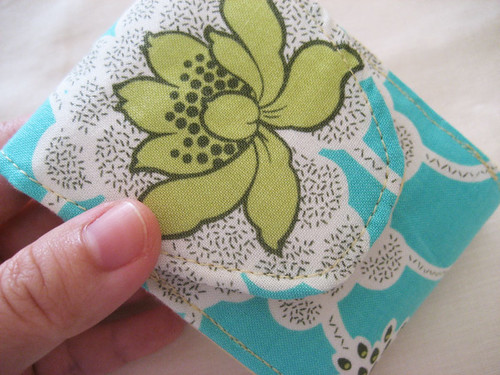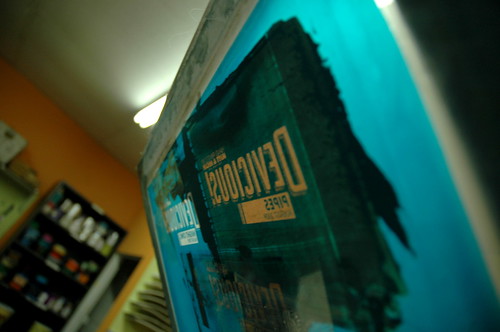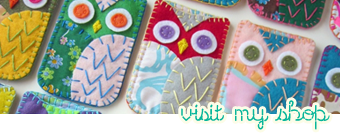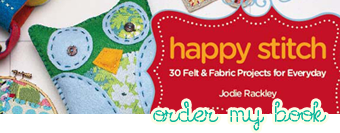The economy has been a huge bummer this year and will probably continue to bum us out well into 2010. Big business has taken huge hits, bank bailouts, unemployment & foreclosures are still on the rise. Impulse buying & buying on credit is out. Lots of independent businesses across the US have closed up, plenty right in my town, and even us Etsy sellers have felt the pinch - since about March/April of this year. Everything was incredible on Etsy and then March happened, ha! Sales have declined like crazy, there's a large influx of new sellers on Etsy, and people are just not spending like they once were - food, clothing, & shelter are at the top of everyone's list. (not to further bum people out on the economy, just being honest)
Anyhow, what I'm getting at is that now more than ever I feel its important to shop at local businesses, independent retailers, farmers markets, etc. support your neighbor & neighborhood. To me the dream of being self employed and independent business coexists with the 'American Dream', which is quickly becoming the American Nightmare. We are big corporate, big business, big bank, big government central. Independent businesses create wealth for our local communities, drives competition in business, generally supports better labor practices, and the list goes on. I don't know about you, but I find the fact that Wallie World is the largest US employer down right scary.
As we approach the holiday season, please take the time to consider independent, handmade, & locally owned business for all your shopping needs! There's lots of info below!!!
Check out this website on the 3/50 Project - it also includes a big list of independent Brick & Mortar stores in every state in the US : http://www.the350project.net/home.html
Pledge to Buy Handmade! Visit BuyHandmade.org to sign the pledge and encourage others to do the same!
A Few Good Reasons to Buy Handmade from Buyhandmade.org:
Buying Handmade makes for better gift-giving.
The giver of a handmade gift has avoided the parking lots and long lines of the big chain stores in favor of something more meaningful. If the giver has purchased the gift, s/he feels the satisfaction of supporting an artist or crafter directly. The recipient of the handmade gift receives something that is one-of-a-kind, and made with care and attention that can
be seen and touched. It is the result of skill and craftsmanship that is absent in the world of large-scale manufacturing.
Buying handmade is better for people.
The ascendancy of chain store culture and global manufacturing has left us dressing, furnishing, and decorating alike. We are encouraged to be consumers, not producers, of our own culture. Our ties to the local and human sources of our goods have been lost. Buying handmade helps us reconnect.
Buying handmade is better for the environment.
The accumulating environmental effects of mass production are a major cause of global warming and the poisoning of our air, water and soil. Every item you make or purchase from a small-scale independent artist or crafter strikes a small blow to the forces of mass production.
From MSNBC.com :
Small retailers feel sharper pinch
Chris Fine has been selling remote-controlled cars, boats and other hobby items for 27 years.
These days, he’s hoping he’ll be able to hang on another few months.
“I hope I make it to December because I’m going to do everything in my power,” Fine said on a recent day in which he had sold a paltry $26 in items by midday. “I’ve got to figure out a way to survive.”
As the recession has gripped the nation over the past year and a half, Fine said monthly sales at his store, Mid-Hudson Hobbies in Middletown, N.Y., and online business, Fine Design, have tumbled by more than 50 percent.
Perhaps most disturbing, Fine said entire swaths of business — such as his customer base in hard-hit Michigan — have fallen away completely amid rising unemployment rates there and elsewhere.
For many, he suspects, it’s an easy choice between buying a new hobby item and paying the utility or food bill.
“This is disposable income,” he said. “If people have any extra income, they come in.”
Although the recession has been a struggle for all U.S. retailers, there is evidence that it has been especially difficult for the nation’s smaller, independent retailers. With Americans cutting back drastically on their spending, some stores have lost business as shoppers have turned to cheaper discount chains, while others have found that their customers have simply gone without the kind of discretionary items some small retailers sell.
Sales at privately held retailers fell 3.63 percent on average for the first seven months of this year, as compared to an average drop of 1.34 percent for publicly held companies in the same period, according to Sageworks Inc., which provides financial data on privately held companies. The data is based on financial records from thousands of accountants.
The focus on penny pinching is especially hard for small retailers that deal in widely available items, like books or music, and may find it difficult to match the prices at big chain or online discounters.
“Those are the ones that have had the biggest challenge and have really had to find ways to add value to their service,” said Jeff Milchen, co-founder of the American Independent Business Alliance, which helps community businesses band together to promote their businesses.
In addition to the drop in business, experts say small businesses may be having a tougher time in part because they don’t necessarily have the cash reserves to make it through a deep trough. The credit crunch has exacerbated that problem, leaving some small retailers unable to obtain credit to either ride out the storm or keep the inventory they need to stay in business.
“Independent businesses obviously are smaller and don’t have the financial wherewithal to survive a sustained downturn maybe in the same way that their bigger counterparts do, and so that’s obviously a concern,” said Stacy Mitchell, a senior researcher with the Institute for Self-Reliance, which promotes local community development.
Faced with few other options, many small business owners may also find that they have to rely on their personal savings or credit cards to stay afloat, meaning that any businesses troubles can quickly translate into personal financial problems as well.
Burning through savings
To keep his hobby business going even as sales have plummeted, Fine and his only remaining employee – his brother – have stopped taking paychecks, and he’s burned through much of his savings. Nevertheless, he said he’s behind on his home mortgage and worried about whether he’ll be able to pay next month’s rent on his store.
Meanwhile, he’s watching many of his competitors go out of business, along with several other local businesses in the downtown area where he’s located.
He said he’s also facing stiffer competition from his suppliers, some of whom have dropped prices on their own mail-order retail business in order to attract more customers.
On a recent night, Fine said he was up until 5:30 a.m. tinkering with his Web site and racking his brain for other ways to pump up his business. It’s a position he never dreamed he’d find himself in.
“It’s very frustrating to be at this point in my life, at 50 years old, to have to worry about this,” he said.
Perhaps the worst part of Nishan Shepard’s day is the drive home.
“I go home every day and see a new store boarded up,” said Shepard, who has run Rockridge Kids in Oakland, Calif., for the past 17 years.
As he’s watched so many of the other local businesses in this once-vibrant shopping district succumb to the recession, Shepard said he’s also struggled to accept that his business has had to change substantially.
Customers that once regularly splurged on high-priced toys are now shopping for cheaper items, or not at all. Last holiday season, he said, “We didn’t sell a product that was $79.99 and up.”
To cope with the recession, Shepard said the store, which sells toys, strollers, furniture and other items, has started agreeing to discount an item when a customer requests it, something he’d never previously done in 17 years business.
Meanwhile, he’s also increasingly overhearing one customer offer to sell another customer their used strollers or other items, effectively taking a sale away from him right in his own store.
To avoid drastic measures such as cutting his staff of nearly 20, Shepard said he’s rooted around for ways to save money on things like phone bills and warehouse space. He said that’s allowed him to keep his competitive advantage: expert advice and customer service.
Meanwhile, Shepard himself is dealing with a drop in income as well as a substantial hit to his retirement savings, meaning he’s had to cut back on spending himself.
“It does bother me to some degree, but it also makes me understand when my customers come in and don’t spend as much as they might have two years ago, or are looking for bargains,” he said.
Pockets of hope
Despite the difficult times, Milchen, of the American Independent Business Alliance, said he is heartened to see that many businesses have fought aggressively to keep customers coming in. In the past year and a half, he said, there’s been much more interest in small businesses banding together to form community alliances for marketing and other purposes.
He’s also seeing more consumer interest in community-supported agriculture, in which locals buy produce directly from area farms. As people think more carefully about what they spend money on, he thinks some are also giving more consideration to where their dollars are going.
“There are clearly people who have shifted their spending to Wal-Mart, and I think there’s another group of people who have responded to the recession by making an extra effort to support businesses that are owned by their neighbors,” said Mitchell, of the Institute for Self-Reliance.
After months of fretting, Shepard said he and some other local business owners recently realized that they simply have to get comfortable with the idea that business will not be like it once was.
Shepard also realized that he had been spending so much time worrying about the business that he’d stopped taking time to enjoy his work. He likens it to the period after the Sept. 11 terrorist attacks, when many stores opted to close their doors.
“We decided to stay open, first of all because I’m stubborn (but also because) I just wanted to hear those kids come in, laughing and playing at the train table. I knew it would make me feel better,” he said.
These days, he said, “I’ve started listening to the kids again. … That’s what keeps me going.”
URL: http://www.msnbc.msn.com/id/32586241/ns/business-retail/page/2/
In case that's not enough information:
Here's 101 Reasons to Buy Handmade from Poppytalk Blog:
101 Reasons:
1. help contribute to establishing a new economic model
2. w/ the exception of postage cost - contribute to decrease in fossil fuel erosion
(purchasing mass produced products generally come overseas - barging it all over, production costs etc, sweatshops, fair labour et al.)
3. this new wave of craftspeople are using recycled materials. this is CRUCIAL. there is too much stuff in the world already.
4. purchase from artisans/craftspeople who ENJOY creating their wares. the object holds that positive energy and it spreads.
5. support the artisan directly. the artisan needs more support for their vocation - more than most.
6. support local community. thus building.
7. buying from craftspeople is a conscious decision. people need to be more conscious of spending of where their hard-earned money is going, changing hands etc. this contributes to the bigger picture.
Sonja Ahlers,
Makeitawesome.etsy.com
Another reason:
9. I buy handmade because someone else is using their talents to create gifts and decor that I myself cannot make. Buy handmade today!
Thanks,
Cammi Higley
ScribbleIt.etsy.com
Madeley Rodriguez
ttp://www.chickprint.etsy.com
Karin
stiksel.etsy.com
13. When you give a handmade gift it's more like writing a letter to someone than giving them a newspaper gift-certificate.
14. Human rights & ecological aspects. Buy handmade and you support a true artist. You can be sure that human rights are respected in the making of your gift. Handmade gifts are for many reasons often more ecological than mass produced: indie artists are superb recyclers (and we mustn't forget upcycling, upcycled gifts are a big hit this year!) and of course handmade in most cases outlasts mass produced.
15. Price vs. value. If you buy your best friend a handmade journal instead of a mass produced one and spend twice the money, it'll be worth every penny. Treasures are handmade with love and thought, not mass produced.
Kaija
paperiaarre.etsy.com
Manny
Mannybeads.etsy.com
Thanks!
Cassie
Clementine Jewelry
ShopClementine.etsy.com
19. It guarantees that no one will give the same gift as you!
20. The items are much more fashion forward....there is no "wait-time" for large businesses to design and then mass-produce. One indie designer can list something *today* that he/she made *today.* (So it wasn't designed and planned last Christmas...for this Christmas)
21. Many items are much more environmentally friendly since there is no use of large manufacturing machines, chemicals, labor (some of it probably illegal) and waste. Many Annie and Olive items (for instance) are made from sustainable wool felt that has been naturally dyed, a needle, thread and my two hands.
22. It's fun to see the creativity and excellence of the very, very talented designers out there. It harkens back to the days of old when craftsmanship, creativity and quality were paramount - You are buying items not mass-produced and impersonal but are very personal not only to the buyer, but to the maker.
Bethany
AnnieandOlive.etsy.com
Bueller
Bueller.etsy.com
25. You can be proud knowing that your supporting small businesses.
26. It's great for the economy
27. You don't have to say that you bought it at Ikea.
28. You can be the first one of all your friends to discover a great designer...
Avril Loreti
avrilloreti.etsy.com
Heather Smith Jones
hrsmithjones.etsy.com
Susan Schwake
artstreamstudios.com/shop/
31.) are getting something that is made with love by someone who loves what they do
32.) are giving the handmade artist a huge compliment and actually saying "I love what you are doing" which in turn keeps the artist "doing " it.
33.) are making a personal connection
34.) are telling the gift recipient that you cared enough about them to buy something as individual as they are.
35.) are contributing to an insurance policy that helps to keep the crafting industry alive, in return allowing for more unique and different items to become available each year.
Stacy Altiery
InkSpot Workshop
inkspotworkshop.com
37. -personal
38. -well made
39. -supports an artist
40. -builds community
41. -people appreciate handcrafted pieces
42. -affordable
Mike McDowell
mudpuppy.etsy.com
Marisa
creativethursday.etsy.com
45. Because handmade items are what your Great Great Grandma used to buy.
susyjack*
contemporary paper
susyjack.com
Pamela Sherry
pixelimpress.etsy.com
Stephanie Levy
stephanielevy.etsy.com
50. Supporting handmade artists, which is absolutely vital in this current economy. We need to support local, small businesses and artists over the big corporations.
51. It's handmade! Someone's hands touched that product, and put their time, attention, and love into it. It wasn't mass-produced in some factory where several people attached one item to create the whole over and over and over again.
Molly Schlemmer
paperwire.etsy.com
54. High Quality: the things I make are things I would buy. Many times I need things and when I look for them at the shops I don't find anything that I like or that covers my expectatives. And in fact, this is one of the reasons I began selling handmade things. It was common when I made one for me and then my friends began asking me for them.
55. No human explotaition, (but myself and since I enjoy doing the things it can't be called explotaition!): people that make handmade things usually control the whole 'fabrication' process. When we need someone else's services, we know the people who works with us and pay fair prices for their work. We like to ask for their families and know their children.
56. Environment careful : it is common to use recycled materials when making handmade items.
57. Boost creativity: everyone loves to see and have handmade items around! It makes people feel special! It inspires!
58. Handmade items are great works of art (at affordable prices)!
59. Customized items: how many times you like something someone's wearing and then you go to H&M and notice it was bought there?...and then, everyone is wearing it and all are uniformated.With handmade items you can be sure THIS will never happen!
60. Encourage traditions: how many happy hours have I spent learning how to knit with my mom and grandmom? There will never exist a knitting machine that can tell so many interesting stories!
61. You can always meet and talk directly with the designer, craftmaker or artist that made the piece you bought!...and we will be so happy to talk to someone who bought one of our handmade items!
Martha Gomez
popamox.etsy.com
Susannah Conway
unravelling.etsy.com
64. Money is well spent. Rather then most of the cost going towards the profit margin of a huge conglomeration you’re paying for a fair wage for one (or a few) people.
65. Special and unique. Even something that is handmade in multiples from patterns, cast, etc will still always be a unique and made just for you.
66. One of a kinds. You can have detail and personality in a handmade item that is hard for a machine to reproduce. It is actually better creatively for and artist/designer/crafter to make one offs.
67. Quirkier. Companies won’t commit vast machines/factories to make quirkier, riskier odder things at the risk of not selling 1000’s or millions of mass produced units. But that is exactly what is best and fun about making something oneself. Experimenting with new and different things! Odd shapes and combinations that may not be commercial but are definitely fun.
68. Connection and transparency. It is lovely to know where, how and by who something was made. I’m a born collector (and occasional documenter of said collections) and I love the personal aspect. I particularly love getting little bios with handmade things.
69. Made to last. Unlike Old Navy, Le Chateau, or the many other manufacturers who make things with a purposelessly short (seasonal) lifespan a handmade item will be made to last. This, of course, is much better for the environment. Quality over quantity!
70. Sincerity. People don’t hand craft things just to make money. They’re not just the product of a slick R&D department for profit. They make things that involve years of learned skills, passion, enthusiasm, commitment and sincerity.
Colleen Baran
colleenbaran.etsy.com
Jill Bent
Jill Bent Bags and Pillows
jillbent.com
73. Individuals as opposed big groups tend to come up with more unique things. There is less need to compromise to suit the masses of group think. You support inventiveness and originality.
Nina Jackson
beadsinthebelfry.etsy.com
76. Is buying directly from the maker, which is a much more intimate and personal shopping experience that isn't available from corporate companies.
77. Shares a story; whether it's about the maker, the material used, or the origin, it adds more interest to the item itself. Knowing this increases one's appreciation of the object and decreases the likelihood of throwing it away.
78. Builds a higher appreciation for things they are made with quality, devotion, time, and care.
79. Embraces how things are made and where they come from. This keeps everyone more grounded and appreciative of things.
80. That are often one-of-a-kind and that in turn makes shoppers feel more special.
81. Delivers honestly made merchandise at a honest prices. Products are not marked up purely for their label, but they're priced to sustain a living for the maker.
82. Rewards creative thinking, entrepreneurship, and craftsmanship.
83. Encourages independent thinking that breaks corporation's homogenizing tendencies.
84. Typically supports goods made with greater consciousness of their environmental impact.
85. Embraces and celebrates the diversity of regional cultures, ideas, and resources from around the world.
86. Allows opportunities for customization where shoppers can participate in the creative process to further personalize the item.
87. Inspires collaborations that progressively build upon interesting ideas and products.
88. Celebrates the inherent variety in handmade goods that allows the buyer to more accurately express their own style and personality.
89. Supports the concept of keepin' it real!!
Chika, Dylan & Jean
Chikabird.etsy.com
ladiesandgentlemen.etsy.com
Handmade puts humanity back into our lives. You carefully choose something that you love, that was created with love, and will be received and cherished with love (if it's a gift)
http://www.nyhedy.etsy.com
Kim Quinn Nicholson
kimquinndotcom.etsy.com
kimquinn.com
94. As wonderful as the cyber world is, it is virtual, untouchable. In some ways it connects, in other ways it creates a disconnect—it can be all image and no substance. Handmade is a terrific balance to this tendency. Actual objects that are made by hand have a visceral connection to the real world and to real individuals. They connect and root us in the tangible world in a life-affirming way.
95. When you buy handmade, you buy from the producer. You aren't lining the over flowing pockets of some corporation or distanced executive. You are taking part in a process of revising our economic model to one that rewards hard work, talent, creativity, initiative and personal responsibility.
96. It's just simply delightful.
Erin Sledd
Key Lime Design
keylimedesign.net
98. I also enjoy buying handmade because you can help design what your looking for its a whole different way of shopping.
Crunchy Crafts
100. Because somewhere out there in the world, you are providing additional financial support for stay at home moms, who have chosen to stay home to take care of their kids & provide personalized care & guidance for their children, who in turn will (hopefully) grow up to be better people who will have wonderful memories of their childhood with a parent.
101. Because you could own the next Rothko, Mapplethorpe, etc!
thegreenzebra.etsy.com
Proud member of Etsy Moms Street Team














































